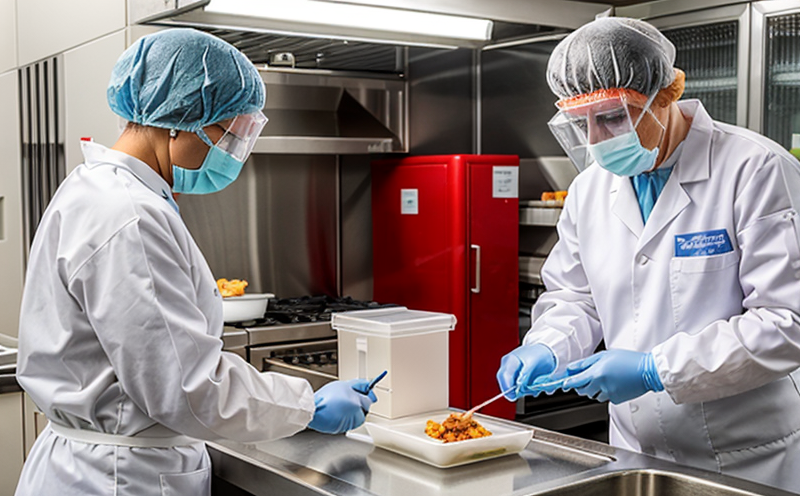AOAC 2007.04 Norovirus Detection in Leafy Greens by RT-PCR
The AOAC International official method AOAC 2007.04 is widely recognized for its robustness and reliability in detecting noroviruses, a significant cause of foodborne illness, particularly in leafy greens like spinach and romaine lettuce. This method utilizes reverse transcription-polymerase chain reaction (RT-PCR) technology to amplify target RNA sequences derived from norovirus strains, allowing for the accurate identification and quantification of these viruses.
Leafy green vegetables are a common vehicle for norovirus transmission due to their frequent handling during preparation. The method's ability to detect even trace amounts of viral material makes it an essential tool in ensuring food safety. By adhering strictly to this protocol, laboratories can provide data that supports compliance with international standards and regulatory requirements.
The AOAC 2007.04 procedure involves several critical steps: the collection of leafy greens samples, homogenization for specimen preparation, RNA extraction using appropriate reagents, reverse transcription to convert viral RNA into complementary DNA (cDNA), amplification by real-time PCR, and finally, analysis via quantitative PCR technology to determine norovirus concentration levels.
This method has been validated against international standards such as ISO 21469-2018. The accuracy of the results obtained from this procedure is paramount for maintaining public health and ensuring that food products meet stringent quality control benchmarks. Quality managers, compliance officers, R&D engineers, and procurement personnel can rely on these precise measurements to make informed decisions regarding product safety.
Leafy greens are often consumed raw or minimally processed, making them particularly susceptible to contamination from noroviruses. The implementation of AOAC 2007.04 ensures that potential risks associated with this type of produce are minimized, thereby protecting consumers' health and enhancing brand reputation for food companies.
The procedure is designed to be sensitive enough to detect even low levels of norovirus contamination, which can help in identifying the source of outbreaks early on. This allows producers and processors to implement corrective actions promptly, reducing the likelihood of widespread illness.
In summary, AOAC 2007.04 provides a standardized approach for detecting noroviruses in leafy greens through RT-PCR technology. Its application is crucial for maintaining high standards of food safety and ensuring compliance with regulatory requirements across various sectors within the food industry.
Industry Applications
- Leafy green producers and processors seeking to ensure product safety and comply with regulatory guidelines.
- Food manufacturing companies aiming to minimize the risk of norovirus contamination in their products.
- Retailers focused on maintaining high standards of food quality and safety for consumers.
- Laboratories specializing in food safety testing, including those performing third-party audits.
The AOAC 2007.04 method is particularly valuable for organizations involved in the supply chain from farm to fork, where ensuring the absence or low levels of noroviruses is critical. By leveraging this technology, stakeholders can contribute significantly to public health by reducing the incidence of foodborne illnesses.
Eurolab Advantages
EuroLab offers unparalleled expertise in executing AOAC 2007.04 for norovirus detection in leafy greens:
- Comprehensive Compliance Support: Our team ensures that all testing aligns with international standards, providing reliable data for regulatory submissions.
- State-of-the-Art Facilities: Leveraging advanced laboratory equipment and methodologies, we deliver accurate and precise results every time.
- Experienced Technicians: Our professionals are trained to handle complex samples safely and efficiently, ensuring the integrity of each test result.
We pride ourselves on delivering not just tests but also actionable insights that help our clients stay ahead in their respective markets. By partnering with EuroLab, organizations can benefit from our deep understanding of the nuances involved in this critical testing process.
Customer Impact and Satisfaction
EuroLab's commitment to excellence has led to significant positive impacts on customer satisfaction across various sectors:
- Enhanced Product Safety: By detecting norovirus contamination early, our clients can ensure their products meet or exceed quality standards.
- Increased Market Trust: Consumers trust brands that demonstrate a strong commitment to food safety. Our testing supports this trust by providing verifiable evidence of product integrity.
- Reduced Risk of Litigation: With reliable data from our tests, clients can protect themselves against potential lawsuits related to foodborne illnesses.
Customer testimonials consistently highlight the value of EuroLab's services in maintaining high standards of food safety. Our focus on accuracy, reliability, and customer satisfaction is reflected in the long-term relationships we build with our partners.





